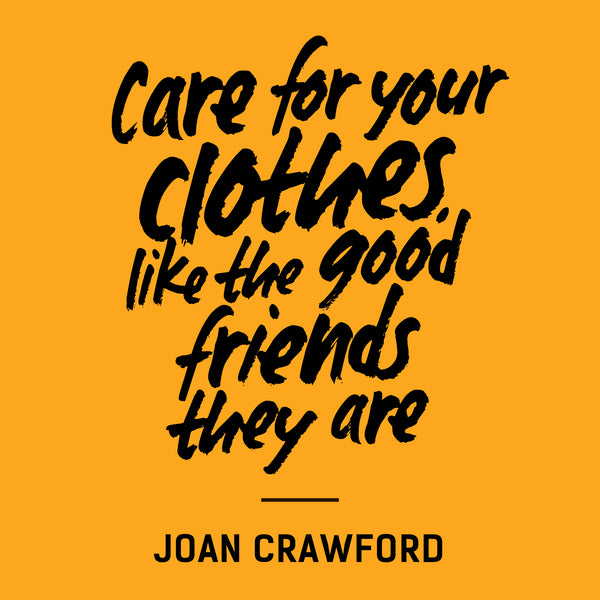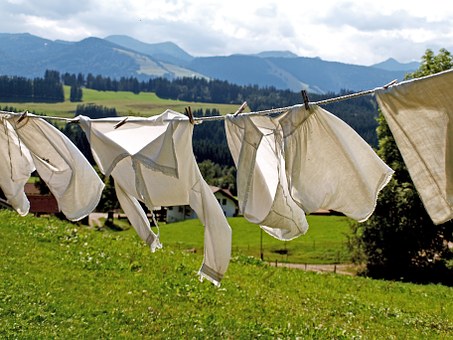Less is more - Sustainable garment care
Posted on August 12, 2021 by Rebecca Närhi | 0 comments
Many people today consider themselves to be eco-concisous when purchasing clothes. As awareness of sustainability and ethical issues in the fashion industry has grown so more and more of us can make better choices when shopping. Some of us are also aware of the materials we choose when buying clothes, knowing the background and the environmental effects helps us to choose wisely.

The environmental footprint of a garment don't end with production, it continues in use phase, depending on how you treat your garments. The ecological and water footprint of a garment are affected by many factors From fibre to finished product, the effect of how you wear, take care and wash your clothes. We all wash our clothes, some of us more than others. A lot of the garments washed on a regular basis are not even dirty, we need to consider airing out or spot cleaning small stains where possible.

(Images from Fashion Revolution)
When it comes to laundry the water consumption is obvious, the amount of water used during one wash can be up to 170 liters, depending on the machine. An important thing to remember if you want to decrease your water footprint when it comes to laundry, is have an eco washing machine, using less water during a wash. You can also extend your knowledge about materials, and decrease the footprint that way. This will make you aware and you’ll know what to choose next time. When producing a t-shirt made with conventional cotton, 25.000 liters of water is used. There are a few unconventional cotton growing methods to reduce the water footprint. Choose organic cotton, GOTS certified ideally (all our cotton is Global Organic Textile Standard certified). You can also decide on other less water-consuming materials.
Why is it important to value the water we have?
Freshwater is scarce and there are parts of the world today that are lacking water. Our annual supply of water is limited and humanity has already exceeded the sustainable limit of water usage. This is not just about water to relieve thirst and to wash clothes, but for the earth, where water is an essential part for a living and prosperous world.
Washing with chemicals?
Today there is a plethora of detergents to choose from, some more friendly than others. There is a wide range of dangerous chemicals to sort out from your daily laundry.
In regular detergent there is a few active and inactive ingredients. The most important ones to keep track on is the inactive ones, they do not contribute when it comes to making your garments clean. These ingredients are made synthetically, and their key role is to change how the detergents look, smell, and how long the product is valid. Active ingredients are the ones making the garments clean, ABS (alkylbenzene perfluorooctane) and LAS (linear alkyl- benzenesulfonates) are two common chemicals. There are a few aspects and problems with these artificial chemicals, since they have a clear connection with excrete carcinogenic particles and are a big threat to the environment. It doesn't end with the active and inactive chemicals, it’s also important to keep an eye on bleaches, phenols, napthas, petroleum distillates, phosphates and all of the different artificial sentences. Most of these chemicals has a negative effect on both human, animals and nature. It causes allergies, are hormone disrupters and toxins waters. This makes it important to make an active choice when buying your detergents and be aware. To make it slightly easier, remember to look for detergents with as few ingredients as possible, and chose alternative eco brands.
Remembering to take care of your clothes in the right way, will make them last for a longer period of time. This includes not washing them to often, too warm or with dangerous detergents and fabric softeners. If always including these aspects, you will not just be taking care of your garments, but yourself, future generations, animals and nature. So next time when you are buying products or do your laundry, think twice.
Easy ways to decrease your water footprint:
- Always ask questions about the product you about to purchase, so that you can make the best decision. Remember to think sustainable and think twice when investing in new things.
- Always choose organic cotton or other sustainable materials such as linen, hemp, and wool, to reduce the water footprint.
- Choose an environmental friendly washing powder, without unnecessary chemicals and bleaches. Stay away from fabric softeners.
- Know the effects of the different chemicals and choose laundry powder on that basis.
- Take care of your clothes and don't wash warmer than recommended.
- Line dry or on a hanger.
Outsider. Ethical & Sustainable Fashion since 2009.
Next →
← Previous




